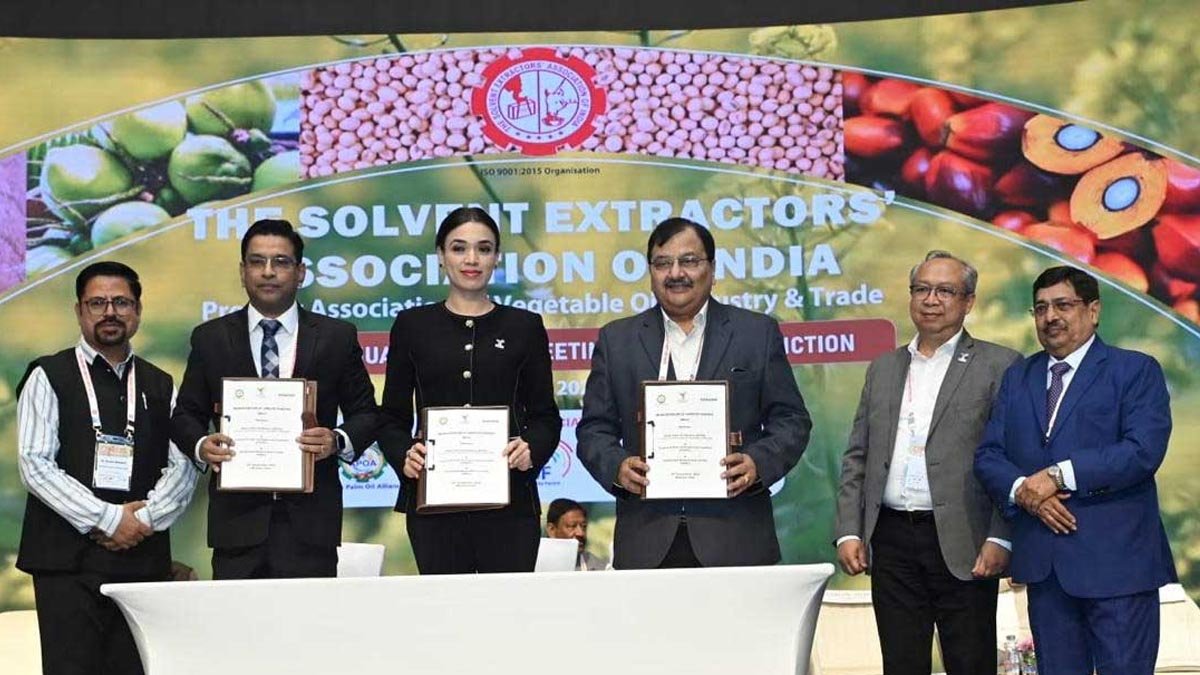PALMOILMAGAZINE, MUMBAI – The Asian Palm Oil Alliance (APOA), the Council of Palm Oil Producing Countries (CPOPC), and Solidaridad have officially signed a tripartite Memorandum of Understanding (MoU) in Mumbai, India. The agreement aims to deepen collaboration between producers and consumers while accelerating sustainability practices across the palm oil value chain, with a strong focus on India and South Asia.
“At a time when food security and price stability are major concerns for both households and businesses in South Asia, this partnership provides a formal platform for producers and consumers to strengthen cooperation and build mutual understanding in addressing shared challenges,” said Atul Chaturvedi, Chairman of APOA, in an official statement received by Palmoilmagazine.com on Friday (Sept 26, 2025).
Under the MoU, CPOPC will act as a catalyst and advocate for sustainable palm oil. The parties agreed to promote alignment and mutual recognition of national sustainability frameworks, including the Indonesian Sustainable Palm Oil (ISPO), Malaysian Sustainable Palm Oil (MSPO), and Indian Palm Oil Sustainability (IPOS) standards, while respecting national laws and regulatory authority. The adoption of regenerative farming practices will also be prioritized.
Also Read:
To ensure stable supply for over 1.5 billion consumers in South Asia, the partnership will encourage traceable, smallholder-friendly supply chains that comply with NDPE (No Deforestation, No Peat, No Exploitation) principles. Pilots will utilize SoliTrace, Solidaridad’s digital traceability platform, combined with remote sensing technology to guarantee traceability from mill to market. A dedicated buyer dashboard will also be developed for India.
As a follow-up, a Joint Working Group has been established, co-chaired by APOA and CPOPC, with Solidaridad serving as the technical secretariat. The group will oversee the work plan, monitor progress, and coordinate communication and advocacy.
Dr. B. V. Mehta, Executive Director of SEA India, emphasized the importance of consumer education: “Indian and South Asian consumers deserve fact-based information about palm oil’s nutritional profile, its role in keeping edible oil prices affordable, and the efforts producers are making to protect forests and support smallholders.”
CPOPC Secretary-General Izzana Salleh reiterated the collective commitment: “This collaboration underlines the importance of responsible palm oil production and consumption in maintaining long-term market trust. We call for alignment with national sustainability standards and reaffirm that smallholders must remain at the core of every solution.”
Shatadru Chattopadhayay, Managing Director of Solidaridad Asia, added: “Consumers in India and South Asia need affordable, traceable, and responsibly produced vegetable oils. Our role is to ensure sustainability is practical for producers and valuable for buyers, supported by credible data, farmer empowerment, and market insights.”
Why It Matters
- Stable supply: Producer–consumer dialogue to address price volatility, logistical disruptions, and policy risks.
- Inclusive sustainability: Training on climate-smart farming, strengthening farmer organizations, and improving access to finance.
- Traceability and trust: Strengthening digital traceability systems to ensure NDPE compliance and transparency for buyers.
- Policy coherence: Developing joint positions in global forums, including options for sustainability criteria in India’s public procurement.
APOA, representing edible oil associations from India, Bangladesh, Pakistan, Sri Lanka, and Nepal under the coordination of SEA India, will represent consumer market interests. CPOPC—an intergovernmental body initiated by Indonesia and Malaysia along with other producing countries—will lead from the producer side. Solidaridad will serve as the technical partner, bridging sustainability standards, digital traceability, and smallholder inclusion with data-driven solutions. (P2)





































